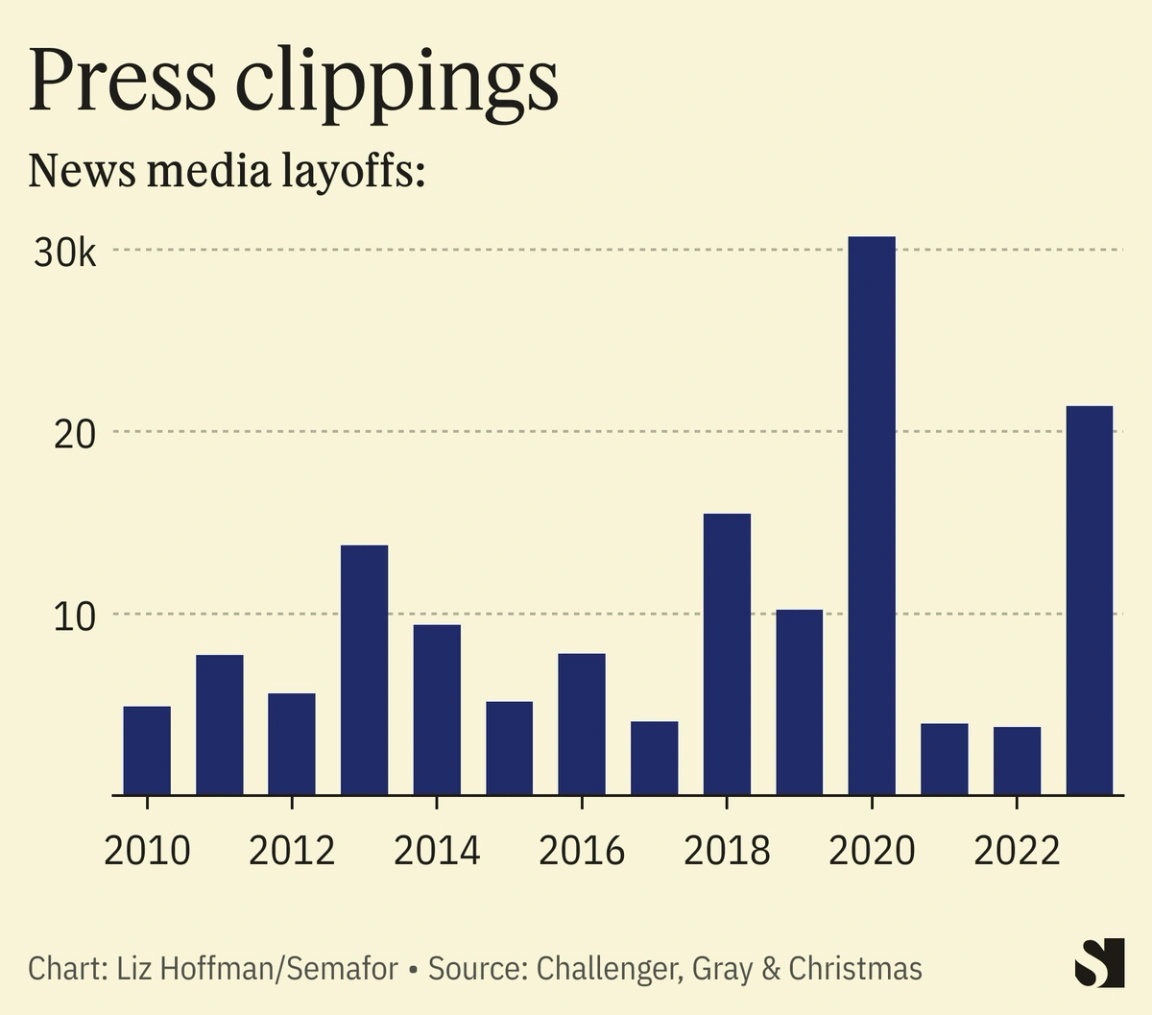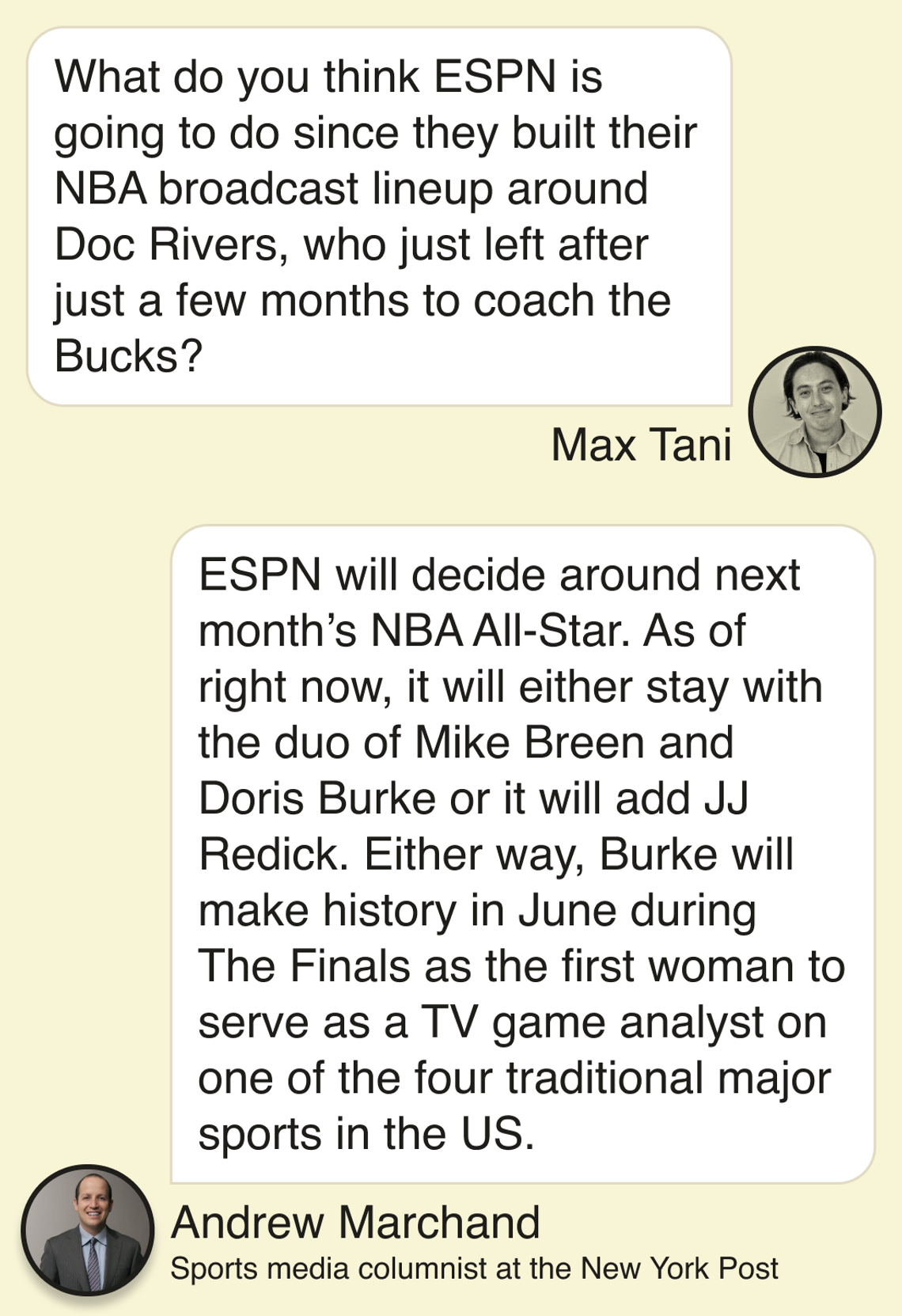 ⁛ NewsLocal interest: The Los Angeles Times last week laid off most of the paper’s Washington bureau. It was the latest data point in a depressing trend of local publications disinvesting from national coverage, which Columbia Journalism Review argues leads to further polarization and the nationalization of American politics. “Without local coverage, the only times most Americans hear about their representatives is from campaign ads or when they’re on national news talking about partisan issues,” Cameron Joseph writes. “That makes it harder for politicians who break with their party to get something done to survive politically—and it makes it harder for issues of local importance that might have crossover appeal to gain any traction.” Beast as prey: Barry Diller seems to be following through on his promise not to sell the Daily Beast six months after a deal collapsed that would have merged the digital tabloid with Hollywood media news startup The Ankler. Semafor was curious about some of the other names in the mix around the time that Beast parent company IAC was considering a sale. According to two people familiar, IAC also had conversations with several other Southern California-based executives, including Brian Calle, the publisher of LA Weekly, and Michael Reinstein, the chief executive of Regent, a Beverly Hills based private equity firm. The company is still searching for a new CEO after the departure of Heather Dietrick, who left the Beast last year for Outside Interactive. The Message: Messenger editor-in-chief Dan Wakeford told staff last week that the company would be updating employees this week about its future, including potential new investors and funding. But one person familiar with the company’s fundraising efforts told Semafor that it is still working to secure the full investment it needs. Founder Jimmy Finkelstein has remained outwardly optimistic, telling some staff that the publication is not shutting down, and that he has promising leads that would keep it afloat. Platformed: Sherwood, the media subsidiary of the trading platform Robinhood, has picked up the syndication deal with the scoopy and insightful newsletter Platformer, founded by Casey Newton, from Vox Media. Sherwood, run by Josh Topolsky, will publish select Platformer articles on its site and in its Snacks newsletter. “I love what they’re building at Sherwood. It’s really exciting to have a chance to work with Josh again, and we can’t wait to share Platformer with the huge Snacks audience,” Newton said in a statement. ☊ AudioBy the numbers: In the aftermath of George Floyd’s murder by police in 2020, a number of news media companies promised to hire more journalists from more diverse backgrounds and include more diverse voices in coverage. Some of that enthusiasm has faded amid backlash to diversity, equity, and inclusion initiatives, but City Cast has continued to report diversity statistics. Last week, the local podcast startup released data tracking how well guests on its podcasts matched with racial, ethnic, and gender breakdowns of the cities where the podcasts were based. CEO David Plotz told NiemanLab that the podcast guests largely mirrored national breakdowns, with the exception of Latino and hispanic guests, who made up 9% of podcast guests compared to 19% of the overall US population. ✰ Hollywood Mike Coppola/Getty Images Mike Coppola/Getty ImagesWild, Wild, Westbrook: Earlier this month, Semafor reported on the internal troubles at Will and Jada Pinkett Smith’s media company Westbrook, which since The Slap, has been forced to cut staff amid a significant dropoff in revenue. Last week Westbrook announced a major restructuring of the company, winding down its ambitions to expand into digital media, and focusing on television, film, and some entertainment marketing projects for Westbrook Studios. Westbrook told staff that as part of the move, the president and COO were leaving the company, and it would be laying off another 26 employees. In the wake of Semafor’s story highlighting decisions by two top leaders to take millions out of the business, the company is looking into the report, a person familiar said. Another person close to the company told Semafor that like many others in the entertainment industry, Westbrook has had to adapt to changing market dynamics and has decided to restructure its business to focus on what it specializes in. Read more details here. Boxed out: In 2023, no American films ranked among the 10 highest grossing in China despite highly anticipated sequels in the “Mission: Impossible,” “Fast & the Furious” and “Spider-Man” franchises. Get me rewrite: Jay Penske did not like what he read about Lily Gladstone’s nomination for Best Actress in Killers of The Flower Moon. Last week, The Hollywood Reporter described her as the first acting nominee who “hails from people indigenous to the land now occupied by the United States.” The Ankler reported on Thursday that the CEO of the entertainment news behemoth was not pleased with the description of Gladstone, prompting THR to quietly tone down the language in the piece. |









